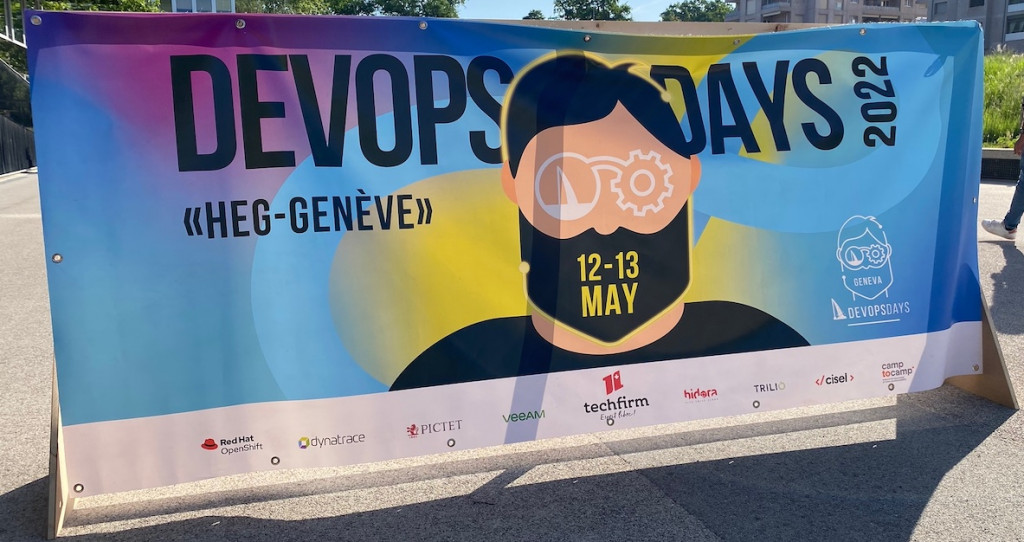
- Finally… this young event (3rd edition) for romandie is back after 2 years! It has brought together more than 400 people involved in DevOps culture for 2 intensive days, allowing people to share knowledge and networking in a very great atmosphere.
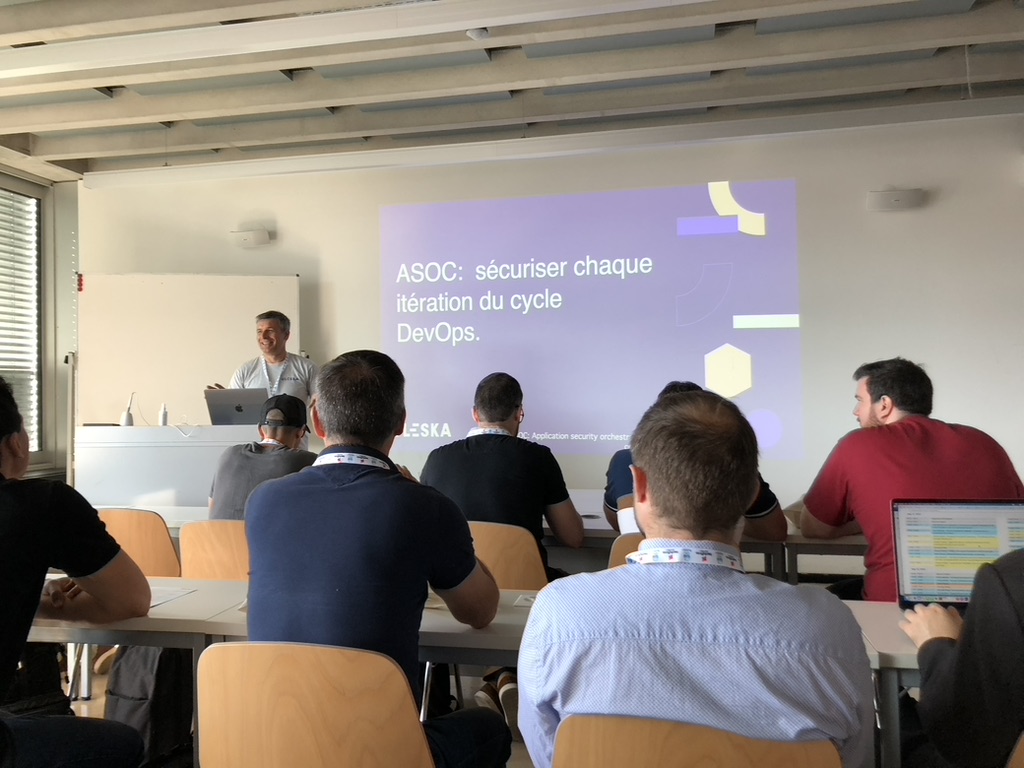
- It started first day in a workshop, with Nicolas Thomas from Uleska, talking about Application Security Testing Orchestration (ASTO), the idea is to implement security at each step, each iteration of a product lifecycle and conduct by a function called AppSec, of course driven by the security team and through all standards Application Security Test (AST), for exemple DAST, IaC, SAST, aso …
One important fact when exposing an application to the internet is that his surface attack can’t be void and the more feature is deployed the more you have risks.
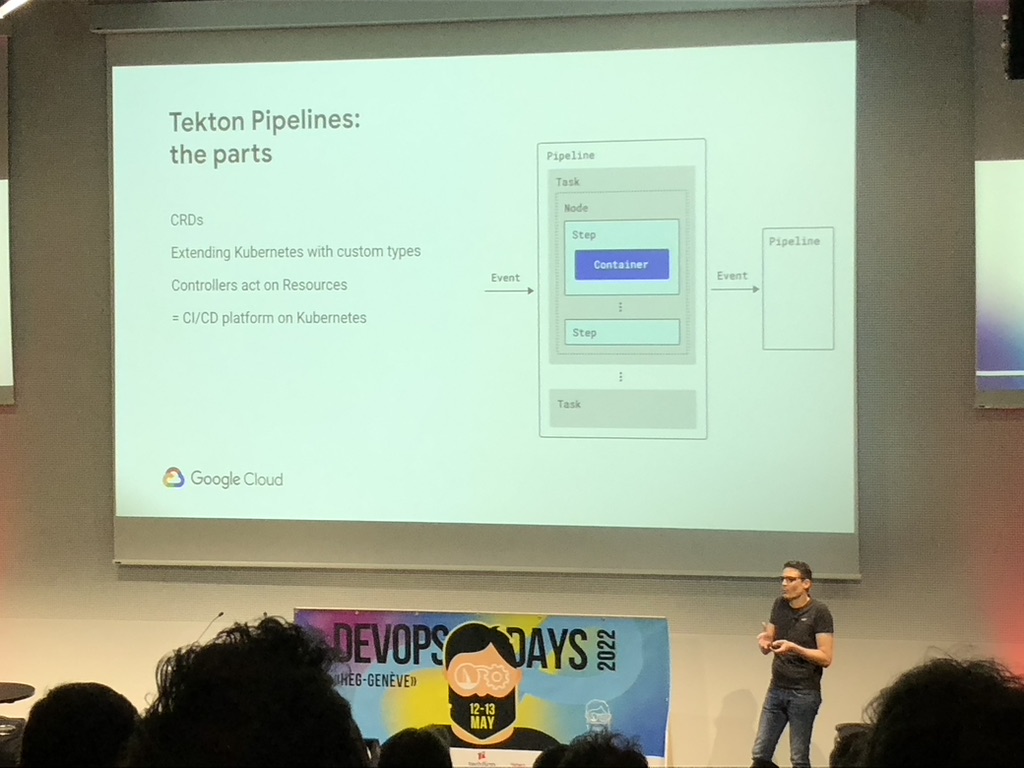
- After that, I followed the talk about Tekton with Giovanni Galloro from Google who did some CI/CD promotion of the product, Tekton is well known from Jenkins-X users because it is embedded with other tool, but for this presentation, the focus was on functionality it offers, with tasks, pipelines, triggers and he ended with a demo.
- Before lunch, we had another talk with Dennis Jannot from Solo.io who described how to manage communication outside pods (ingress controller) and kubernetes in general (gateway), in clearer words about service mesh. Solo.io company provides Gloo Edge product, an equivalent for it is Istio. Their solution simplifies components in comparison when using only Istio, thus allowing easy management of mesh functionalities like external auth server or rate limiting server and also additional capabilities with gloo filter in ingress Gateway (WAF, Data loss prevention, JWT, transformation, …).
Why re-inventing the wheel?
After a great lunch, it was time to do some networking with the contest organized by the event, I was happy to find many people from my past experiences in Geneva or Lausanne.
- Back at talks for the beginning of the afternoon, I followed the “show” from Charles Laziosi and Vincent Journel who started with a real life situation when you use an application with your mobile and you experience a network outage, what a mess when you get the famous t-rex with the desperate message “There is no Internet connection”
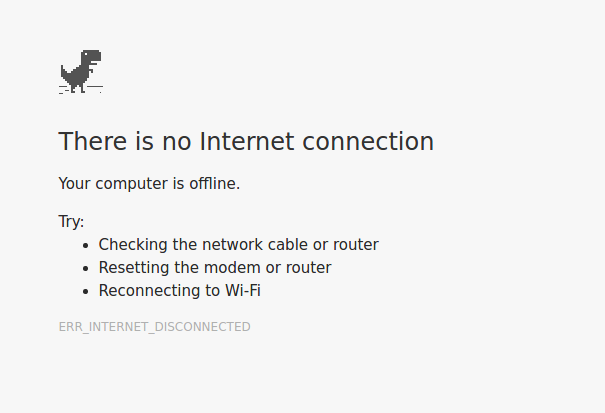
This is where their topic started with “How offline first-architecture could save your apps!” which change the paradigm, when you expect no outage, they take connectivity as an opportunity to sync all your change with server with providing an offline architecture, brilliant!
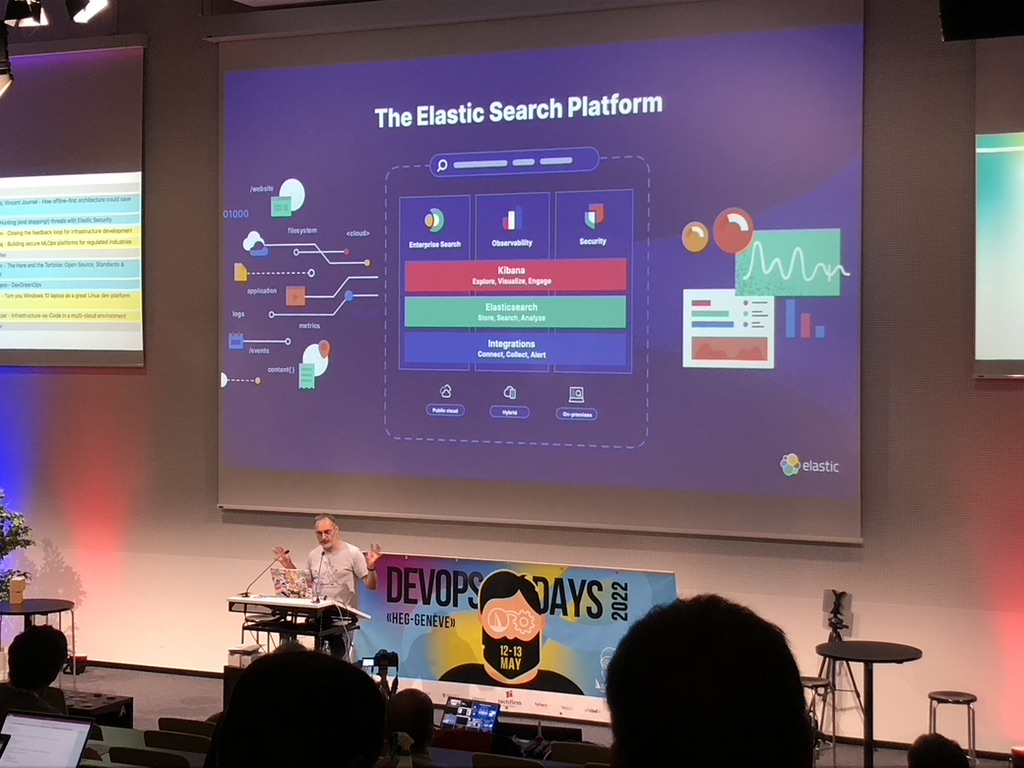
- Next talk, right after, was with David Pilato from Elastic, he presented the topic “Hunting (and stopping!) threats with Elastic Security”, where he showed the power of “observability” when using the Elastic Search Platform to collect and compute metrics which can give some interesting insight about threatenings and how to manage them. David made a demo and shows an interesting point of view of how to use the Elastic suite.
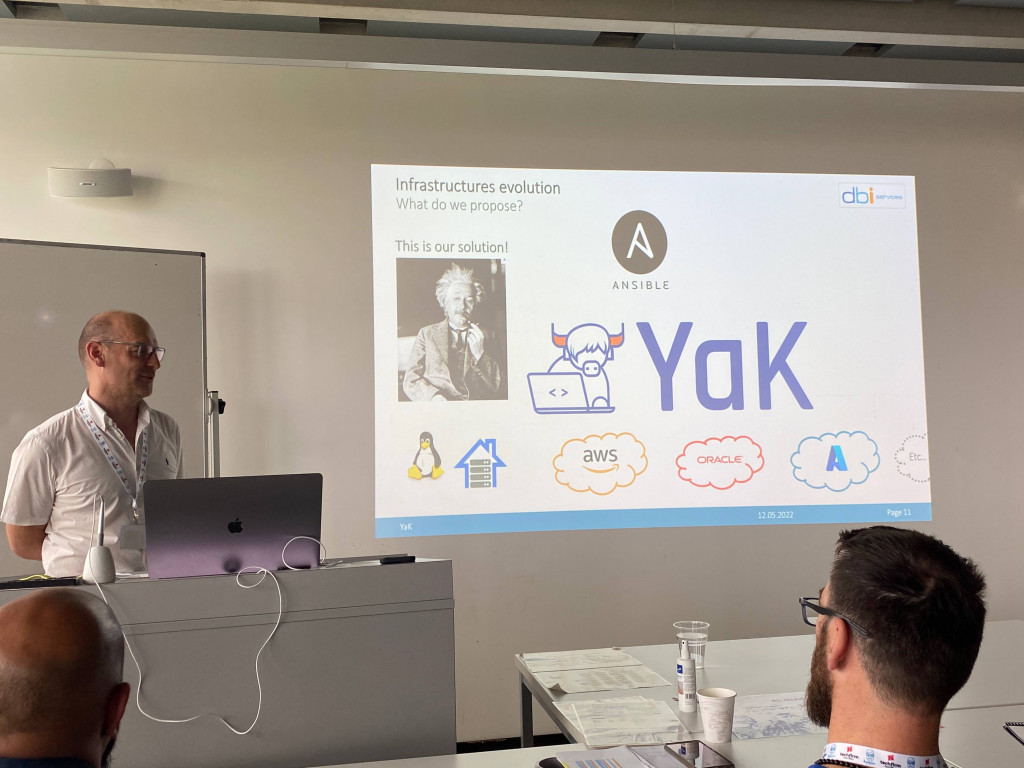
- Before ending this first day, I followed Hervé Schweitzer, our CTO’s workshop, with the topic “Infrastructure-as-Code in a multi-cloud environment”, this project, the YaK, is about to provision quickly and repeatably infrastructure in any popular cloud (AWS, Azure, Oracle cloud) or on-prem without being afraid by complexity with all different cli. This has been made possible with the great knowledge of dbi services experts on different cloud providers and Ansible, reducing management of your servers to only configuration part.
This is for the public part, because the product will be divided in 2 parts, the other one will be what is called DMK packages, allowing you to deploy an oracle instance in any cloud!
Fun story told by Hervé during his demo, he asked “where do you think your oracle instance will be more efficient once it will be installed regarding the 3 cloud plaftorms?”, the natural answer is AWS, but no, it’s better optimized in oracle cloud and this is due to S3 storage which is less well managed.
The audience where very impressed regarding numerous smart questions at the end of this workshop.
This very well ended this first day of event.
The evening was very pleasant with a very nice cocktail dinner organized by the fantastic team of DevOpsDay Geneva.
2nd day
- For this second day, the agenda was a little bit different with main room dedicated on talks and Open-spaces sessions (4 times during this second day) to discuss freely on topics discussion posted by participants on first day. I personally didn’t followed these Open-spaces sessions but only the talks in the main room.
- Talks for this second day started at 9:00 AM with Ankur Marfatia with “Turning an Enterprise to a Learning Community”. It was all about bringing or improving all kind of sharing knowledge with many types of examples. What’s cool is that it was not intended for big structure but also for smallest infrastructure. The main idea is starting you, who is part of a community, a group, a company, a post, a tech article, in fact everywhere and anytime to share. In return, the community will also share, help, discuss with you so that you’ll learn something from it. One of the example given was very relevant to me, yes, when example are made with food, it’s the best!
Think of knowledge as a pizza, share it, so that anyone can get a piece of that knowledge!

In that way, writing this blog is exactly the purpose of this topic and in the DNA of dbi services.
#sharing
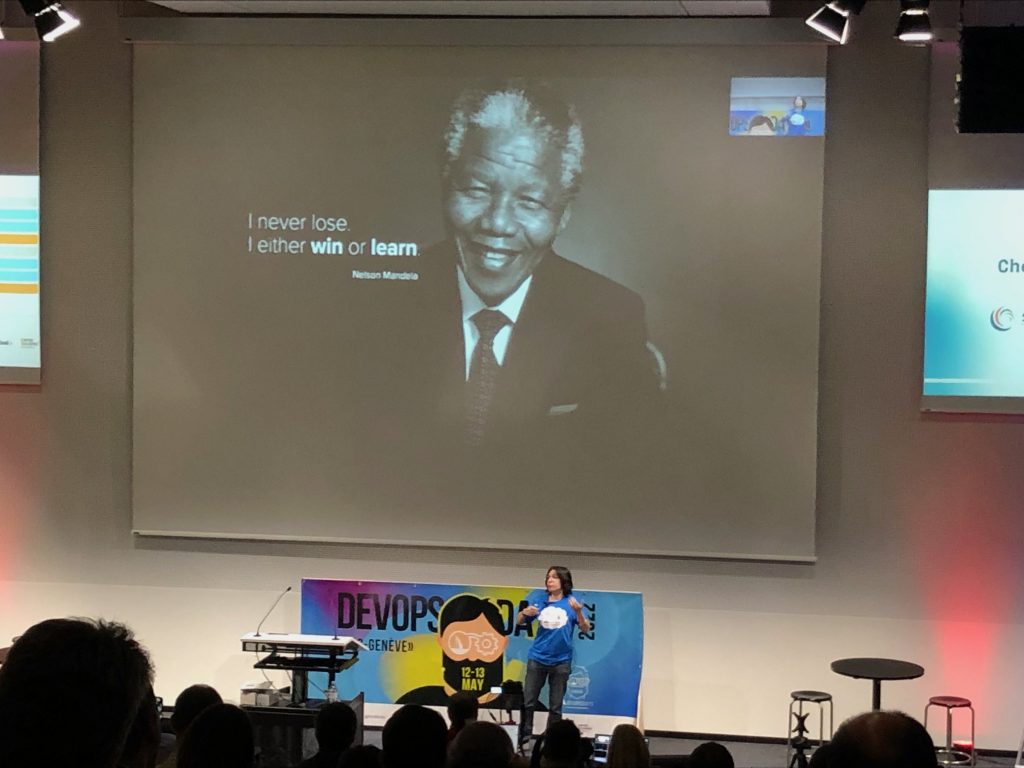
- Second talk of the morning was with Aurélie Vache, a french punchy talk about the Impostor syndrome.
Wow, I loved the way she make everyone’s feeling better in finding people place in a such high technology and principle that is DevOps. I would recommend anyone to hear her talk and start to do talks, write blogs, articles about their personal knowledge, experiences, aso…
- After a coffee break, the morning continues with 2 other talks, first one was with Courtney Heba coming from Microsoft directly from the US and talked about “Building Mastery into your Daily Practice”.
It was very interesting to hear how we can integrate mastery in every action we do in our every day role.
A nice exemple given was with driving a car :
- first when you learn how to drive, all is Cognitive, you have to think all your moves and understand them
- then it can become Emotional, you start feeling your moves and you start getting some assurance doing them
- Finally, it’s all Physical, in other word, all your moves are natural, your drive is smooth
- And last talk of the morning was with Dr. Joe Perez, about how to “Driving decisions with Data: Delight or Disaster”. He was very demonstrative showing how people react in a specific situation regarding their cognitive biases.
Once again, we had the lunch break to do some nice networking.
- The afternoon started with Doc-as-code with Sandro Cirulli from The Scale Factory.
Everyone has ever heard his responsible asking for documentation and everyone has also his “own way to do it” and to formalize it even if there is an enterprise solution, Sandro was pointing common problems with documentation, like :
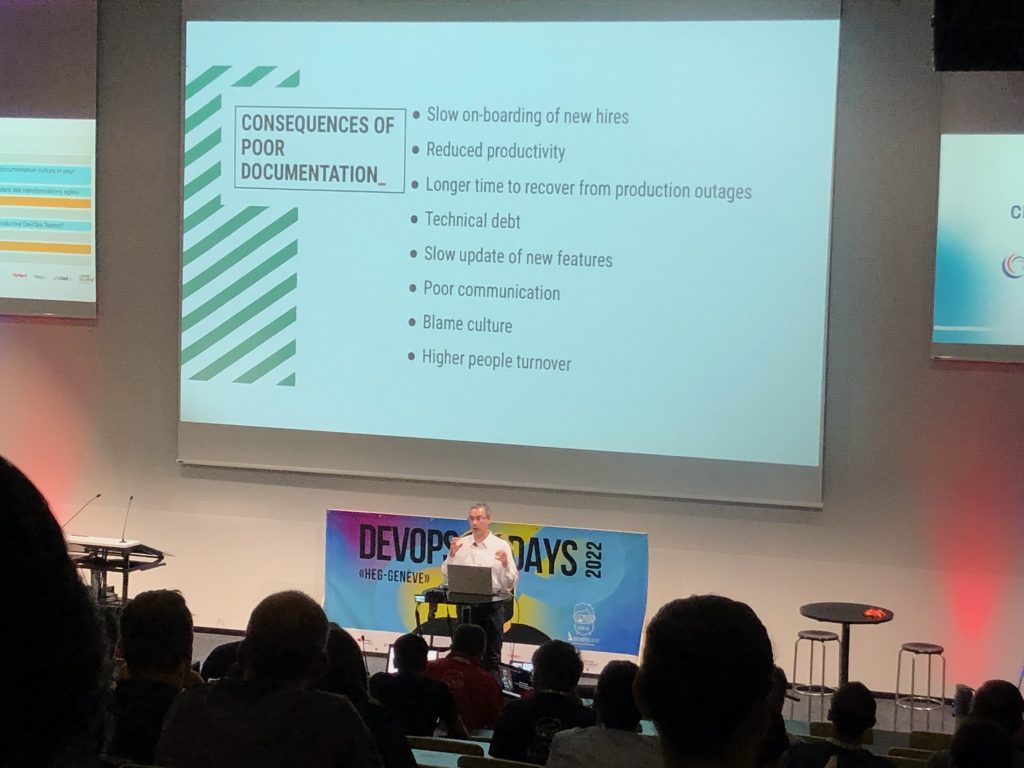
- no documentation
- too much documentation
- documentation out dated
- aso
and all this is leading to people working slowly, creating micromanagement to understand why is it so… Sandro gave in his talk some hints to help writing docs, where and how to store them.
In conclusion, treat documentations as you treat code and instil this culture in your organization are the best advice.
- After that, Stéphanie Fischer talked about her own experience with agility in many situations, her dreams versus reality and how she managed to improve everywhere she was asked to coach.
- Last talk for this event was with Scott Graffius and his Journey to more productive DevOps teams through multiple phases from forming people by providing the “big picture” of what is expected, to storming with some strategies to help team to grow and move forward by encouraging and honoring commitments, then to Norming which is more on individual focus and monitoring the team, then 4th phase was about performing and celebrating success, while last phase was about adjourning and the individual and team recognition efforts before releasing all people involved together.
This last one concluded two intensive days of knowledge, best practices, sharing spirit and very good feelings to be confident in our DevOps role.
Thanks for that and I’m confident that there will be the 4th edition next year from what I heard from Matthieu Robin!
![Thumbnail [90x90]](https://www.dbi-services.com/blog/wp-content/uploads/2025/05/martin_bracher_2048x1536.jpg)
![Thumbnail [90x90]](https://www.dbi-services.com/blog/wp-content/uploads/2024/03/AHI_web.jpg)
![Thumbnail [90x90]](https://www.dbi-services.com/blog/wp-content/uploads/2022/08/HER_web-min-scaled.jpg)